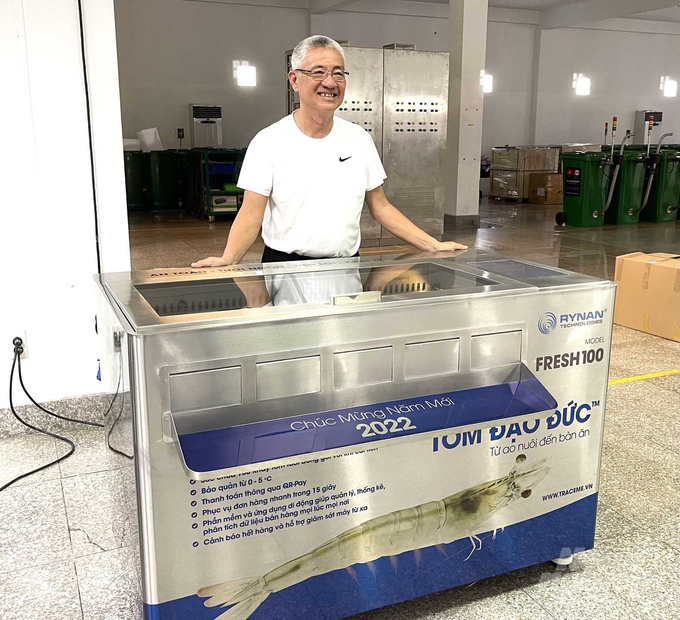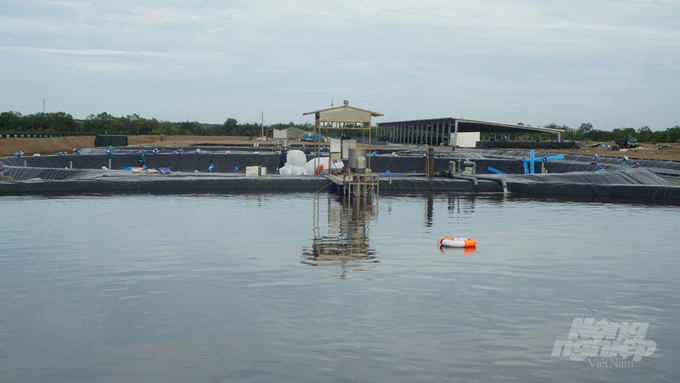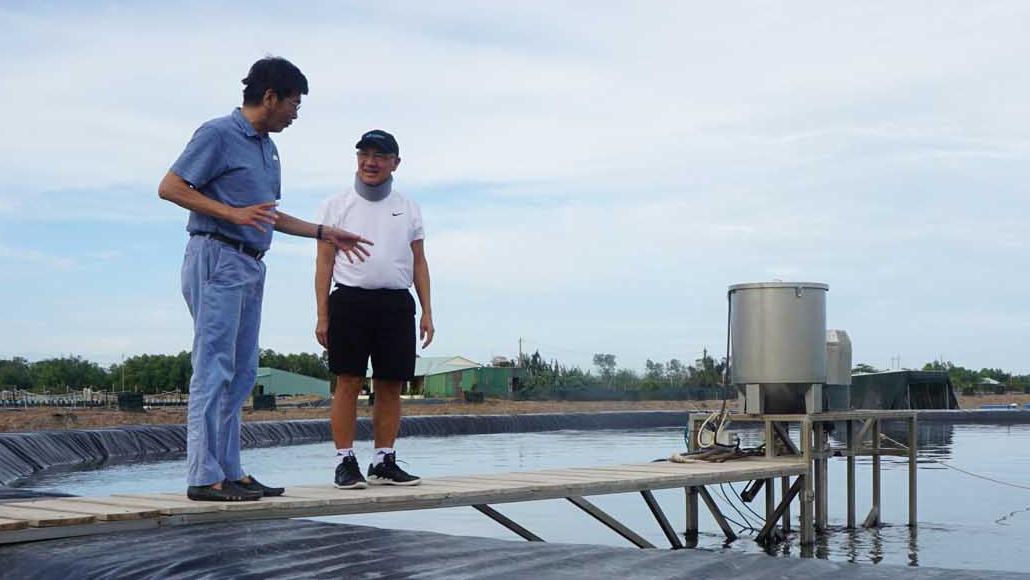May 30, 2025 | 15:15 GMT +7
May 30, 2025 | 15:15 GMT +7
Hotline: 0913.378.918
May 30, 2025 | 15:15 GMT +7
Hotline: 0913.378.918
In November 2020, Dr. Nguyen Thanh My (Chairman of the Board of Directors of Rynan Technologies Vietnam) established Salicornia Ngon Bien JSC. Standing on a 7.5 ha shrimp farming area that was recently invested by Salicornia to acquire a new technology application pond system in Duyen Hai district, Tra Vinh province, Dr. My expressed his confidence when saying that the invention of new devices combined with digitization would create breakthroughs in the shrimp farming field.
Dr. My is highly regarded thanks to his many achievements in the field of scientific research and useful inventions. He is also one of the successful economic investors in his hometown of Tra Vinh. When entering the seafood field, Mr. My humbled himself, admitting that he was just “an outsider” in the shrimp farming story. “I search for knowledge, study, and conduct research, all just to contribute some new technological innovations to help shrimp farmers. I want to contribute and travel along with the standard journey of ‘ethical shrimp standards – from pond to table”.

Dr. My invented the packaging machine to preserve fresh shrimp for 3 months, which is convenient for consumption, improving product value. Photo: Huu Duc.
Studying Vietnam’s shrimp industry since the beginning of 2020, Dr. My identified four major problems. Firstly, the output is low, reaching 1 – 2 tons of shrimps/ha/year, while in other countries such as India, the output can reach 6 – 7 tons/ha. Secondly, due to bacteria and parasites, shrimp farmers use a lot of antibiotics, leading to the existence of antibiotic-resistant super bacteria. The situation is added with another difficulty when more than 75% of the shrimp industry’s value chain depends on traders.
The last problem lies in the high production costs. Most of the shrimp feed producers are foreign companies. Vietnam’s shrimp farming enterprises have to import almost 100% of input materials, thus shrimp feed accounts for 55 - 60% of production costs.
With a new mindset comes a new way of doing things, Dr. My said, “There are three steps in digitalization, including data digitization, process digitization (process automation) and digital transformation. The purpose of these steps is to collect a big amount of data that helps create new value.”
The most difficult thing in shrimp farming is how to automatically collect data. Automation based on artificial intelligence is too expensive for farmers today. Therefore, Dr. My offered 3 levels of solutions: manual, semi-automatic and automatic. For example, in Salicornia’s shrimp farming area, just taking a picture of a shrimp on the smartphone and the system would be able to analyze its weight today or whether it is growing properly.

Fully automatic shrimp pond area of Salicornia Ngon Bien JSC in Duyen Hai district. Photo: Huu Duc.
Having a full understanding of farmers’ hardship specifically in terms of capital, Salicornia is applying models that help to reduce input costs from seeds, technical equipment, feed, and product costs.
Salicornia’s model has the ultimate goal of securing uniform model application procedures and output quality. Shrimps will be cultivated in safe procedures and guaranteed in terms of origin, meeting the export standards of meticulous markets such as Japan and Europe.
Rynan Mekong is an application of Salicornia in the App Store. Farmers can install it on their smartphone to remotely control and update shrimp situation, monitor water, which makes shrimp farming more convenient.
The model also applies the smart shrimp feeder model AIF 100 (priced at VND 30 million/machine) which has three operating modes, including manual mode, automatic mode and AI algorithm combination mode. Especially, the third mode will coordinate with monitoring stations and equipment to measure environmental indicators and the parameters of shrimp to conclude how much food the shrimps need in a day. This type of machine helps to save feed up to 20%.

Dr. Nguyen Thanh My (right) introduces investors to oxygen-rich shrimp farming technology. Photo: Minh Dam.
Salicornia’s shrimp farming model is being implemented in Tra Vinh, Ben Tre, Soc Trang, and Bac Lieu on the basis of the association between cooperatives. Farming technology and equipment are actively produced domestically by Salicornia (available right in Tra Vinh) so the price is relatively cheap, available for cooperative-scale shrimp farming. The company can create production linkage and call for the companionship of banks to lease or sell equipment to shrimp farmers while accepting deferred payments.
Harvesting shrimp daily
Currently, Salicornia’s shrimp pond areas are oriented toward the in-house shrimp farming model using solar panels. Shrimp can be harvested every day instead of the normal 100-day period. This approach solves the quantity pressure, selling directly to consumers.
During the Covid-19 pandemic, the question of convenience is consumers’ top concern. With the "ethical shrimp" packaging machines (prices from 200 to 500 million VND/machine), shrimp farmers can apply improved gas packaging technology, allowing shrimp to be preserved for up to 3 months. "Consumers who buy our processed shrimp products just need to put them in the microwave for 3 minutes and then use them right away. This convenience is one of the selling points that help shrimp farmers increase profits," said Dr. My.
Translated by Samuel Pham

(VAN) Several scientists and farmers are experimenting with soil treatment in some key durian-growing regions such as Cai Lay (Tien Giang), Dak Song, Gia Nghia, and Dak R’lap (Dak Nong).
/2025/05/25/4127-3-073637_820.jpg)
(VAN) Thanks to the promotion from an FAO-implemented project, vegetable production in greenhouses in Moc Chau has seen strong development, from 1.5 hectares in 2021 to nearly 50 hectares in 2024.

(VAN) FAO has recently supported USD 140,000 to implement the project 'Risk mitigation human-animal interface risks through disease control initiatives in pig farming.'

(VAN) The People's Committee of Tra Vinh province has approved an adjustment to the investment policy for the Green Hydrogen Plant project, increasing its area to approximately 52.76 hectares.
![Reducing emissions from rice fields: [2] Farmers’ commitment to the soil](https://t.ex-cdn.com/nongnghiepmoitruong.vn/608w/files/news/2025/05/05/dsc08881jpg-nongnghiep-140632.jpg)
(VAN) Clean rice cultivation model in Thuong Tan commune, Bac Tan Uyen district, is assisting local residents in achieving sustainable agriculture by substantially reducing costs, increasing productivity, and protecting the environment.

(VAN) At the conference to disseminate Resolution No. 68, AgriS introduced its digital agricultural ecosystem and reaffirmed its commitment to accompanying the Government in promoting private sector development and sustainable agriculture.

(VAN) 'Blue Ocean - Blue Foods' initiative is designed to restore marine ecosystems and establish sustainable livelihoods for local communities by cultivating a minimum of 1,000 hectares of cottonii seaweed in the first three years.